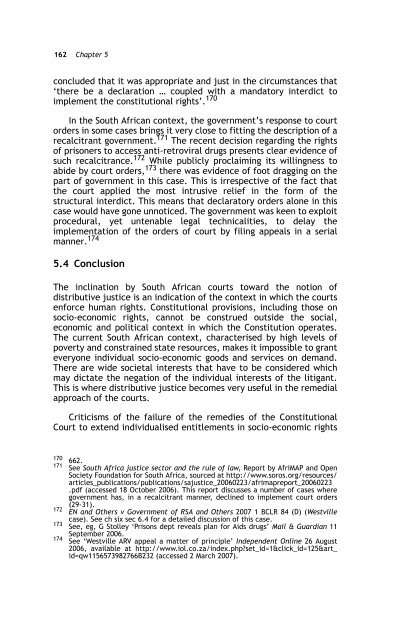LITIGATING SOCIO-ECONOMIC RIGHTS IN SOUTH AFRICA - PULP
LITIGATING SOCIO-ECONOMIC RIGHTS IN SOUTH AFRICA - PULP
LITIGATING SOCIO-ECONOMIC RIGHTS IN SOUTH AFRICA - PULP
Create successful ePaper yourself
Turn your PDF publications into a flip-book with our unique Google optimized e-Paper software.
162 Chapter 5<br />
concluded that it was appropriate and just in the circumstances that<br />
‘there be a declaration … coupled with a mandatory interdict to<br />
implement the constitutional rights’. 170<br />
In the South African context, the government’s response to court<br />
orders in some cases brings it very close to fitting the description of a<br />
recalcitrant government. 171 The recent decision regarding the rights<br />
of prisoners to access anti-retroviral drugs presents clear evidence of<br />
such recalcitrance. 172 While publicly proclaiming its willingness to<br />
abide by court orders, 173 there was evidence of foot dragging on the<br />
part of government in this case. This is irrespective of the fact that<br />
the court applied the most intrusive relief in the form of the<br />
structural interdict. This means that declaratory orders alone in this<br />
case would have gone unnoticed. The government was keen to exploit<br />
procedural, yet untenable legal technicalities, to delay the<br />
implementation of the orders of court by filing appeals in a serial<br />
manner. 174<br />
5.4 Conclusion<br />
The inclination by South African courts toward the notion of<br />
distributive justice is an indication of the context in which the courts<br />
enforce human rights. Constitutional provisions, including those on<br />
socio-economic rights, cannot be construed outside the social,<br />
economic and political context in which the Constitution operates.<br />
The current South African context, characterised by high levels of<br />
poverty and constrained state resources, makes it impossible to grant<br />
everyone individual socio-economic goods and services on demand.<br />
There are wide societal interests that have to be considered which<br />
may dictate the negation of the individual interests of the litigant.<br />
This is where distributive justice becomes very useful in the remedial<br />
approach of the courts.<br />
Criticisms of the failure of the remedies of the Constitutional<br />
Court to extend individualised entitlements in socio-economic rights<br />
170<br />
662.<br />
171 See South Africa justice sector and the rule of law, Report by AfriMAP and Open<br />
Society Foundation for South Africa, sourced at http://www.soros.org/resources/<br />
articles_publications/publications/sajustice_20060223/afrimapreport_20060223<br />
.pdf (accessed 18 October 2006). This report discusses a number of cases where<br />
government has, in a recalcitrant manner, declined to implement court orders<br />
(29-31).<br />
172 EN and Others v Government of RSA and Others 2007 1 BCLR 84 (D) (Westville<br />
case). See ch six sec 6.4 for a detailed discussion of this case.<br />
173<br />
See, eg, G Stolley ‘Prisons dept reveals plan for Aids drugs’ Mail & Guardian 11<br />
September 2006.<br />
174 See ‘Westville ARV appeal a matter of principle’ Independent Online 26 August<br />
2006, available at http://www.iol.co.za/index.php?set_id=1&click_id=125&art_<br />
id=qw1156573982766B232 (accessed 2 March 2007).
















